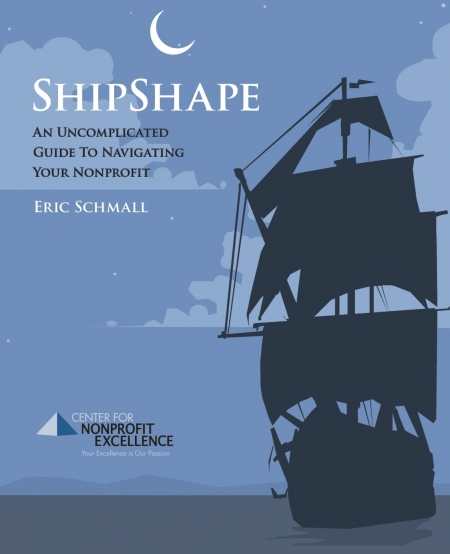ShipShape
An Uncomplicated Guide to Navigating Your Nonprofit
Schmall helps nonprofits think not only about how to navigate rough waters, but why they sail at all.
Anyone associated with a nonprofit organization will benefit from ShipShape, Eric Schmall’s “uncomplicated guide to navigating your nonprofit.” While comparing an organization to a ship, whether floating or floundering, is not a new idea, Schmall takes the metaphor from top to bottom, illustrating how an organization’s stakeholders work together like the owners, crew, and passengers of a vessel, plotting the course, sailing with the wind, and navigating rough waters. The book demonstrates that even a nonprofit running a steady course with a happy crew and captain can still learn from other ships on the sea.
Schmall’s work is clearly different from other nonprofit reference books. The well-written introduction hints that this will be a fun read, stretching the mind to ponder what makes a ship sail while encouraging a back-to-basics approach to strategic evaluation of the strengths and weaknesses within your organization.
The cover, designed by a student at the Kentucky School of Art, is beautiful. Every detail has been carefully considered to make this a comfortable book—easy to read and a pleasure to look at—meant to engage a broad audience from CEOs to volunteers. Familiar buzzwords for organizational planning are replaced with inspiring concepts relevant to the sailing metaphor.
Instead of discussing stakeholders and programming related to the organization’s mission, Schmall encourages visualization of passengers aboard a ship, powered by programming that serves as the wind in the sails, driving an organization toward its destination. The mission may even change over time as the passengers inform the destination. The captain, or CEO, may be a tyrant and perhaps the crew, or staff, have thought of mutiny. The further into the metaphor the author goes, the easier it is to step back and see complicated and sensitive issues from a fresh perspective.
A consultant and manager for more than forty years, Schmall writes with the wisdom of his experience and a refreshing enthusiasm for his subject. Each chapter introduces one aspect of the sailing metaphor and ends with a brief summary, “Compass Points,” and a series of evaluative questions. For instance, “Does your organization have a vision of the ideal world it’s trying to create?” And “How might your board improve upon its understanding of the passengers’ (stakeholders’) changing needs?” These deceptively simple questions create a participatory experience, actively engaging a critical examination of boards, staff, programs, investors, etc. Schmall then uses a short real-life example to bring his metaphor back into the real world. How does a board deal with staff who bypass the chain of command? How can a new CEO get answers to questions which have never been asked?
ShipShape can be a valuable introduction to management strategies and an objective tool for addressing tough questions about key concepts. By removing personal reference points and replacing them with a metaphor, a nonprofit’s board members may find themselves looking differently at their captain (CEO) and crew (staff). The vision and values, sometimes not clear for younger or less experienced organizations, could be more purpose-driven if seen as a destination and reason for sailing.
ShipShape is sometimes overly elementary. It would have retained its power without an entire chapter devoted to the meaning of “metaphor.” Nonetheless, Schmall’s concept is not a gimmick. He dissects the overall metaphor thoroughly, creating a convenient new vocabulary for effective governance, and his effort deserves applause. Anyone with a role to play in the nonprofit sector will want a copy to read, recommend, and revisit.
Reviewed by
Sara Budzik
Disclosure: This article is not an endorsement, but a review. The publisher of this book provided free copies of the book and paid a small fee to have their book reviewed by a professional reviewer. Foreword Reviews and Clarion Reviews make no guarantee that the publisher will receive a positive review. Foreword Magazine, Inc. is disclosing this in accordance with the Federal Trade Commission’s 16 CFR, Part 255.

